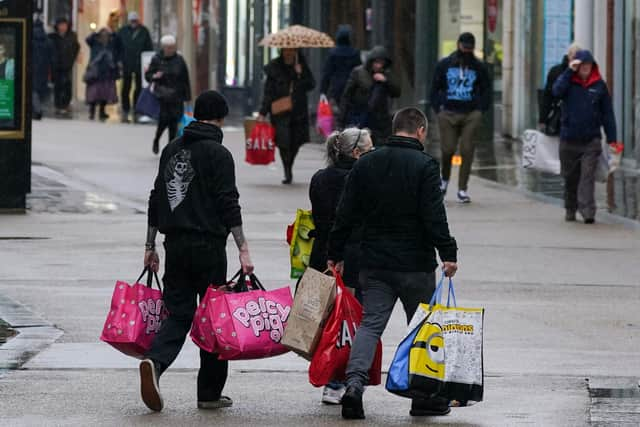Shock fall in UK retail sales may be 'temporary setback' as consumer confidence lifts
A shock fall in UK retail sales in the run up to Christmas may prove a “temporary setback” analysts have said, with consumer confidence tipped to rise in the coming months.
Official figures showed that the amount of goods British retailers sold in December fell at the fastest rate in three years as under-pressure families shifted part of their festive shop to earlier in the year.
Advertisement
Hide AdAdvertisement
Hide AdSales volumes tumbled 3.2 per cent in December, data from the Office for National Statistics (ONS) revealed, compared with a rise of 1.4 per cent the month before. The ONS said that there was some evidence that customers had done more Christmas shopping than usual in November, taking advantage of Black Friday sales in some cases.


This meant that December saw the biggest drop in sales for the retail sector since January 2021, when the country was still under Covid-19 pandemic restrictions. It was also much worse than the 0.5 per cent decline that economists had forecast on average, according to estimates supplied by Pantheon Macroeconomics.
Figures from the Scottish Retail Consortium earlier this month revealed that sales north of the Border had fallen for the sixth month in a row during December. Total sales, measured by value rather than volume, fell by 2.4 per cent in December, once adjusted for the effects of inflation, compared with the same month a year earlier.
The latest UK-wide ONS data also showed that the value of the items that customers bought in December had fallen, by 3.6 per cent in this case. Food shops saw their sales volumes down by 3.1 per cent while sales in non-food shops were 3.9 per cent lower. Worst hit were department stores, whose sales dropped 7.1 per cent in a very quiet December period.
ING developed markets economist James Smith said the dismal figures may prove just a temporary setback with the potential for December’s fall to be reversed in the first quarter of this year.
He noted: “In reality, the consumer backdrop is starting to improve and that’s hard to square with the scale of December’s decline. With consumer confidence having recovered, real wage growth positive and the mortgage squeeze being dampened by the fall in market rates, we think December's fall in retail sales will be reversed in the first quarter.”
Silvia Rindone, retail lead for consultancy EY in the UK and Ireland, said: “Although Christmas 2023 may not have yielded the sales retailers were hoping for, there are reasons to be optimistic as we enter 2024.
“Real wages are set to grow again as inflation continues to fall, energy prices remain stable and interest rates are likely to have peaked for the time being, all of which could lead to increased consumer spending. Non-food retailers who have taken the time to understand their customers’ priorities and evolve their proposition are reaping the benefits and standing out from the crowd. This is not an easy process and many retailers are still struggling.”
Comments
Want to join the conversation? Please or to comment on this article.